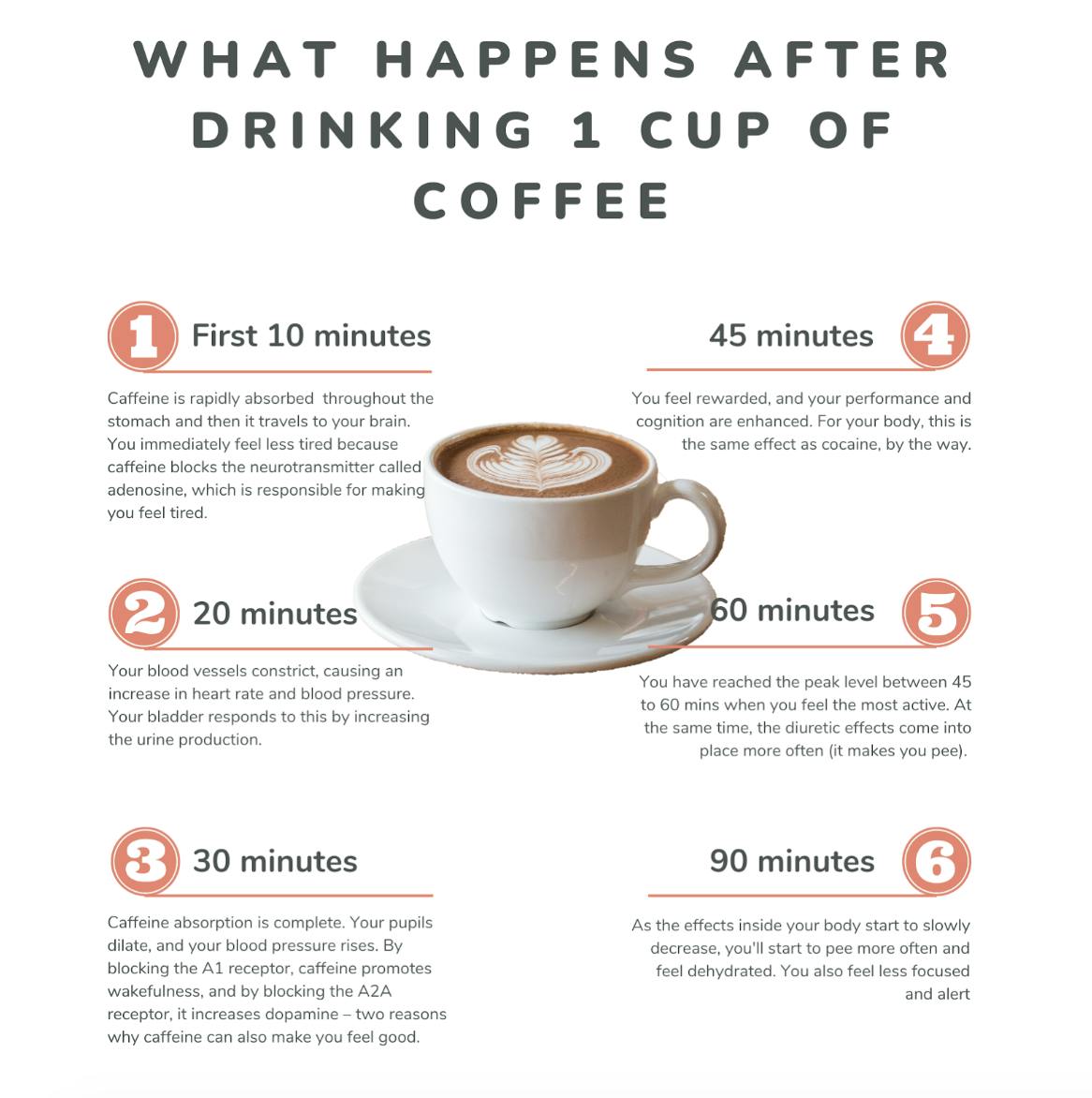What happens to your body 1 hour after drinking coffee
Reviewed and fact-checked by Giulia Guerrini, Superintendent Pharmacist. Read our editorial policy to see how we create informative, accurate content.
Ever wondered after taking that first sip: "how does coffee actually affect my body?" When you feel wired and ready to tackle your to do list, you can feel that the caffiene has had an effect, even if you're not sure how it works. Wonder no more – we've got a full run down of what happens when caffeine enters your body from just one cup, from the first ten minutes post-cup to an hour later.

Here's a general overview of the effects of caffeine on the body:
First 10 minutes:
Caffeine is rapidly absorbed throughout the stomach and then it travels to your brain. You immediately feel less tired because caffeine blocks the neurotransmitter called adenosine, which is responsible for making you feel tired.
Adenosine: Risks + 4 Ways to Lower It (Beyond Caffeine), J Cohen, BS.
20 minutes:
Your blood vessels constrict, causing an increase in heart rate and blood pressure. Your bladder responds to this by increasing urine production.
Read more: Caffeine and blood pressure: a critical review perspective, Cambridge university press.
30 minutes:
Caffeine absorption is complete. Your pupils dilate, and your blood pressure rises. By blocking the A1 receptor, caffeine promotes wakefulness, and by blocking the A2A receptor, it increases dopamine – two reasons why caffeine can also make you feel good.
45 minutes:
You feel fantastic – and your performance and cognition are enhanced. Caffeine is having basically the same effect as cocaine on your body right now, by the way, as the two drugs stimulants similarly alter a specific signalling path in the brain. It's a much milder effect (obviously – and you'll still be at your desk, not a rave), but it works the same.
Read more: Coffee same as cocaine, Beverage Daily
60 minutes:
You have reached the peak level between 45 to 60 mins: this is when you feel the most active and energised. At the same time, the diuretic effects come into play more (it makes you pee).
Read more: Why Does Coffee Make You Pee?, Houston Metro Urology
90 minutes:
As the effects inside your body start to slowly decrease, you'll start to pee more often and feel dehydrated. You also feel less focused and alert.
It's worth noting that the exact timing and duration of these effects can vary depending on factors such as an individual's metabolism, tolerance to caffeine, and the amount consumed (as we know from a viral recent news story, not all cups of coffee are the same; the BBC reported from a Which? study that 'Costa cappuccino has five times more caffeine than Starbucks').
What are the coffee ingredients and how do they act on your body?
Coffee is made primarily from the roasted seeds of the coffee plant. The primary active ingredient in coffee is caffeine, a stimulant that affects the central nervous system. When consumed, caffeine is rapidly absorbed into the bloodstream through the stomach and small intestine, and then it travels to the brain.
Once in the brain, caffeine blocks the action of a neurotransmitter called adenosine, which is responsible for making you feel tired. This causes an increase in the levels of other neurotransmitters, such as dopamine and norepinephrine, which can improve mood, increase alertness, and improve cognitive function.
In addition to caffeine, coffee also contains several other naturally-occurring compounds that can have an effect on the body, including:
Chlorogenic acids: These are a group of antioxidants that are present in coffee beans. They are thought to have a number of health benefits, including reducing inflammation, lowering blood sugar levels, and possibly even helping with weight loss.
Theobromine: This is a stimulant that is found in small amounts in coffee. It has a similar effect to caffeine but is much weaker.
Melanoidins: These are compounds that are produced during the roasting process of coffee beans. They are thought to have antioxidant and anti-inflammatory properties.
Trigonelline: An alkaloid that is found in coffee beans in small amounts, it is converted into niacin (vitamin B3) during roasting.
Diterpenes: A family of naturally occurring compounds known for their bitter taste and strong biological activity. They are also linked to raising cholesterol levels.
The effects of coffee on the body can be complex and varied and may depend on individual factors such as genetics and overall health status. It's also important to be aware of the high caffeine intake or the amount of sugar in your coffee if you're adding any.
Read more: A Detail Chemistry of Coffee and Its Analysis.
FAQs
Does caffeine have the same effects as drugs?
Cocaine and caffeine both influence the same areas of the brain, but in very different ways. As we noted before, caffeine and cocoaine both work in similar ways, where they alter specific signalling activity in the brain – so they essentially have the same effect (but much milder, obviously). In terms of withdrawal, caffeine withdrawal symptoms are visible, and can serve as a meagre reinforcer (as in, it keeps you taking the drug - coffee - so you won't have to go through them), but none of these effects is as strong as withdrawals related to those addicted to cocaine.
What happens if you drink coffee every day?
Consuming foods and drinks with antioxidants is beneficial for your health and coffee is a great source of these protective compounds. Drinking coffee regularly can help boost your antioxidant levels, making it a healthy choice for daily consumption.
Are the effects of coffee the same for everyone?
Not necessarily. According to Harvard, everyone has different reactions to coffee. This depends on several factors such as preconditions, age, general health and others.

